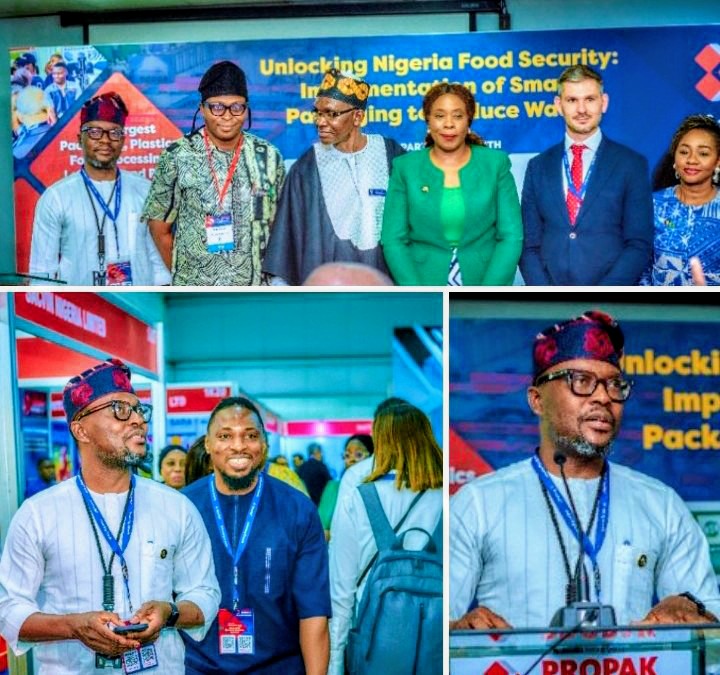… Tasks food industry players on environmental best practice

Lagos State Governor, Babajide Sanwo-Olu, has urged food processing companies to adopt biodegradable and compostable packaging materials as part of efforts to promote environmental sustainability. He emphasized that these eco-friendly alternatives would help reduce plastic waste and safeguard the environment for future generations. The governor’s call aligns with global trends in sustainable practices, aiming to create a cleaner, greener Lagos by encouraging businesses to prioritize environmentally conscious packaging solutions.
4o
According to a press statement signed by the Director, Public Affairs
Kadiri Folashade (Mrs.), it states as thus, at the 11th edition of the PROPAK West Africa 2024: Smart Packaging Conference, held at the Landmark Event Centre in Victoria Island, Lagos, he emphasized the need for innovative approaches in packaging. His call to action urged industry leaders to adopt smarter, more sustainable packaging solutions to stay competitive and meet evolving consumer demands.
Speaking on the theme “Unlocking Nigeria’s Food Security: Implementing Smart Packaging to Reduce Waste,” the governor, represented by the Commissioner for Commerce, Cooperatives, Trade, and Investment, Mrs. Folashade Ambrose-Medebem, emphasized the vital role of food packaging and processing industries in bolstering economic growth. She urged industry leaders to adopt innovative, eco-friendly solutions that not only reduce food waste but also contribute to a more sustainable future. Ambrose-Medebem called on the sector to lead the charge in transforming Nigeria’s food security landscape through smarter, greener packaging technologies.
He said, “The industries represented here today are integral to Nigeria’s economy. They form the backbone of our industrial and manufacturing sectors, supporting various key areas such as food and beverage, pharmaceuticals, agriculture, and fast-moving consumer goods. The development of these industries is vital to ensuring our national growth and competitiveness in the global market.”
The Governor emphasized the vital importance of the conference’s focus on sustainable packaging and the shared responsibilities within the plastics industry. He highlighted how these central themes are key to Nigeria’s economic stability, environmental sustainability, and the health of its people. By addressing food waste through innovative packaging solutions and encouraging cross-sector collaboration, the governor underscored the broader impact these initiatives could have on the country’s future.
“Packaging for food security is a national priority as Nigeria continues to grow in both population and economic ambition. Despite our rich agricultural resources, we still face significant post-harvest losses due to inadequate processing, packaging, and storage. In fact, it is estimated that up to 40% of food produced in Nigeria is lost before it reaches the consumer”, he stated.
He passionately called on all stakeholders to adopt sustainable packaging technologies without delay, highlighting the critical importance of cross-sector collaboration. By working together, he emphasized, we can tackle the challenges of plastic waste and spur innovations that safeguard our environment for the future.
“I encourage every stakeholder here to embrace the themes of this year’s event with urgency and determination. We must actively seek out ways to implement smart packaging technologies that ensure food security and reduce waste. We must collaborate across sectors to manage plastics responsibly and push forward innovations that protect both our economy and our environment”, he remarked.
At the recent event, Dr. Muyiwa Gbadegesin, the Managing Director and CEO of the Lagos Waste Management Authority (LAWMA), took the stage to address a pressing global crisis: food loss and waste. He emphasized how this issue not only exacerbates environmental degradation but also squanders precious resources. In regions like Africa, where food security remains a critical concern, the impact is even more profound. Dr. Gbadegesin’s compelling presentation shed light on the urgent need for sustainable practices to combat this challenge and protect both our environment and food resources.
He said, “According to the Food and Agriculture Organization (FAO), roughly one-third of the annual food produced globally for human consumption—approximately 1.3 billion tonnes—is lost or wasted. These losses are particularly unfortunate in Africa, where approximately 20 percent of the population is undernourished.”
Gbadegesin highlighted the Lagos State Government’s ambitious efforts to tackle plastic waste and foster sustainable packaging. Central to this strategy is the recent ban on single-use plastics, a bold move aimed at curbing environmental damage. This initiative is part of a broader plan to transform Lagos into a model of eco-friendly practices, signaling a significant shift towards reducing pollution and promoting sustainable solutions in the city.
He said “On the 22nd of January 2024, the Lagos State Government announced a ban on the usage and distribution of styrofoam packs and other single-use plastics, as part of efforts to shift the food industry towards a more sustainable practices. Also, in February 2024, Lagos State amplified the need for sensitization of our Food Systems’ Champions on modern ways of packaging, storage, and transportation of agro-produce”.
The head of LAWMA recently highlighted groundbreaking packaging innovations poised to revolutionize the food industry. He emphasized that sustainable packaging goes beyond just preserving products—it’s about protecting the planet. He urged a critical move away from traditional plastics, which are increasingly recognized for their severe environmental impacts. This shift towards eco-friendly solutions not only addresses the pressing issue of waste but also represents a crucial step in safeguarding our environment for future generations.
According to him, “Innovative sustainable packaging must meet all requirements for product safety, waste prevention, shelf life, hygiene, and health. Plastic packaging waste raises the biggest concerns on environmental impact, with 40% of disposable food packaging ending up in ways that negatively affect the environment, such as landfilling and microplastics”, he noted.
He elaborated on various innovative packaging solutions such as bioplastics, biodegradable films, and plant-based materials. These options are key to a circular economy, where packaging complements environmental sustainability rather than depleting it. He showcased how these materials effectively cut down on waste and improve the longevity of products, thus aligning packaging practices with ecological harmony.
He argued that eco-friendly solutions were not only good for the planet but also in tune with current consumer trends. With a growing number of shoppers favoring brands that prioritize sustainability, businesses adopting green packaging stand to benefit from these evolving market preferences. This shift presents a promising opportunity for companies to align with consumer values and drive success through responsible practices.
He said “Statistics show that 45% of customers prefer engaging with environmentally responsible brands such as those that offer eco-friendly food packaging solutions. Out of these consumers, 44% claimed that they would rather settle with a brand that supports recycling and food waste reduction.
“As we navigate the path toward a greener future, biodegradable packaging remains a pivotal solution for a sustainable world. It offers businesses a chance to enhance their reputation while minimising environmental impact, particularly in waste management and landfill diversion”, he concluded.
In his address, Segun Ajayi, Director-General of the Manufacturers Association of Nigeria (MAN), highlighted the event as a promising opportunity to shape a future where nutritious food and innovative packaging are accessible to all. He emphasized the organization’s dedication to prioritizing consumer interests, underscoring their commitment to enhancing food quality and safety.
In conclusion however, the event featured an impressive lineup of speakers, each bringing their unique perspectives to the forefront. Mr. Kofi Essuman, the Vice President of the World Packaging Organisation, shared insights into global trends in packaging. George Pearson, the Regional Director of Afrocet Montgomery, offered a detailed analysis of regional market dynamics. Ahmed Omeh, the President of the African Packaging Organisation, provided a visionary outlook on the future of packaging in Africa. These thought leaders, among others, contributed to a rich and engaging discussion, showcasing their expertise and driving conversations about the evolving packaging landscape.
For waste management related issues and complaints, please call LAWMA toll-free numbers: 080000LAWMA (08000052962), 07080601020 and 617, or visit www.lawma.gov.ng









